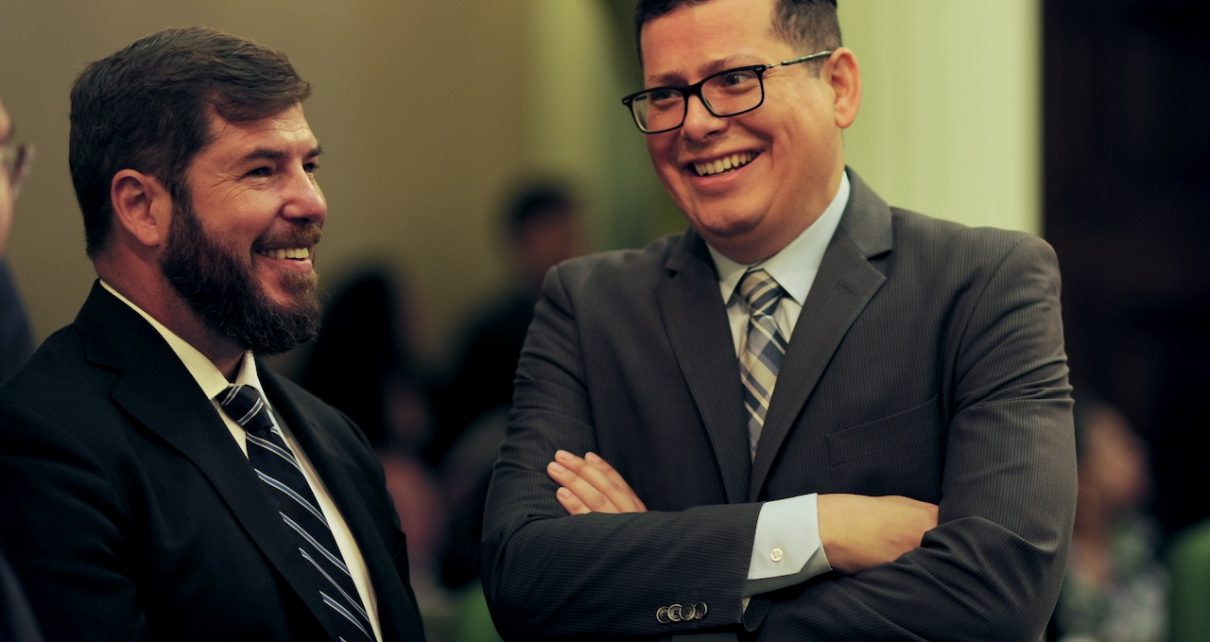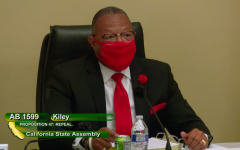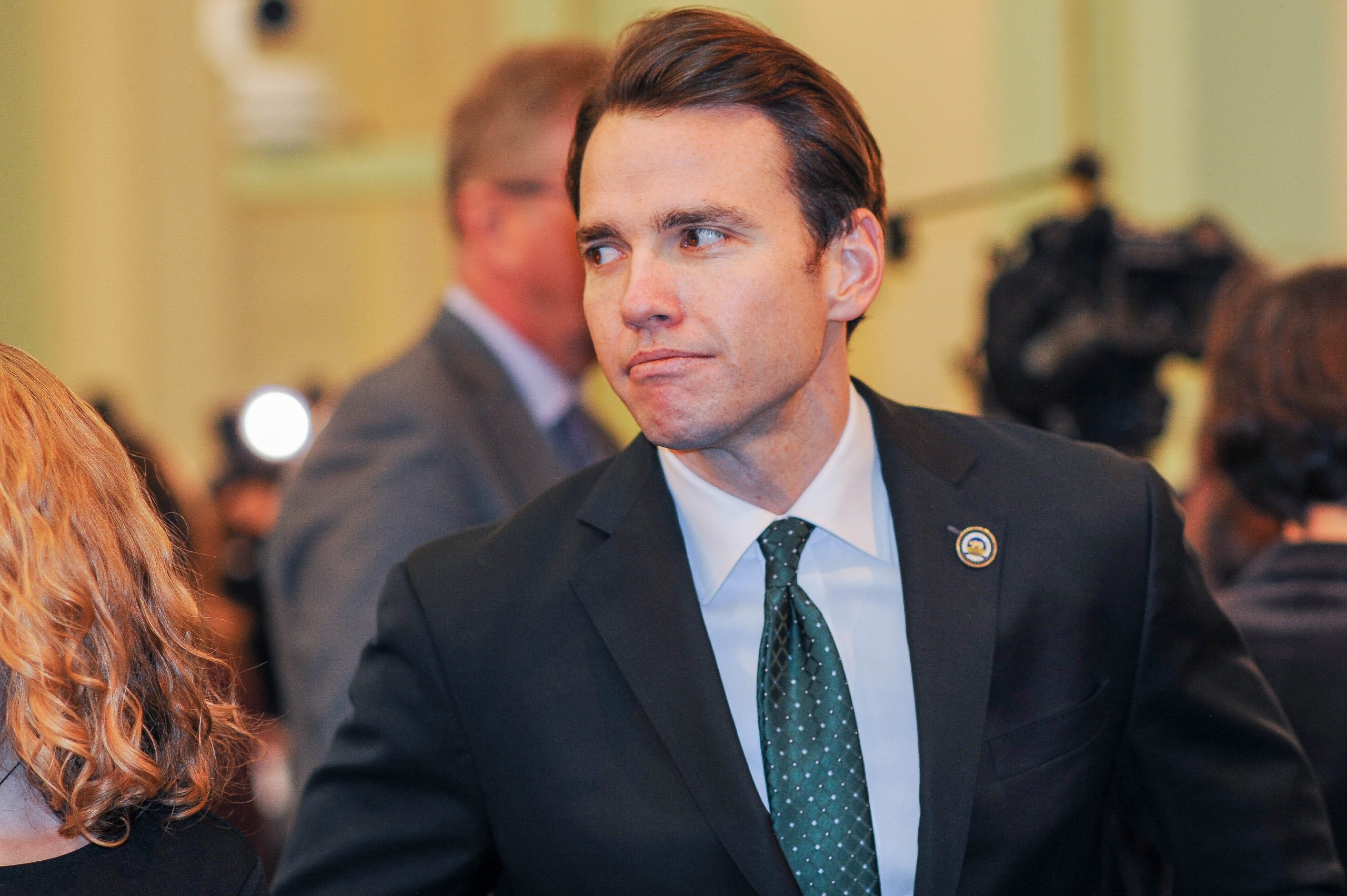
Assemblyman Rudy Salas. (Photo: Kevin Sanders for California Globe)
Prop 47 Reset Fails in Assembly Committee
‘We really have to be concerned about the number of people that law enforcement will go after to fill the prisons’
By Evan Symon, March 24, 2022 12:49 pm
A bill to amend Proposition 47 to lower the threshold amount for felony theft from over $950 to $400 failed in the Assembly Public Safety Committee this week.
Assembly Bill 1603, authored by Assemblyman Rudy Salas (D-Bakersfield), would have reduced the threshold amount for petty theft and shoplifting back down to $400 and would have also re-allow shoplifting to be tried as a felony again but only if the person who did it had prior convictions.
Prop 47, which was passed in 2014 by a voting percentage of 59.6% to 40.4%, increased the felony threshold rate for theft in retail establishments from over $400 to over $950, and lowered misdemeanor thefts having jail time limited to a maximum of 6 months. The goal of the proposition was to reduce the prison population in California and move saved costs more into drug and mental health treatment and at-risk student programs as a sort of crime prevention technique.
However, crime in California quickly rose as a result, with 2018 rates being found to be at least 9% higher when compared to 2014. While rates have continued to go up state wide, San Francisco, due to a combination of Prop 47 and San Francisco DA Chesa Boudin instilling a new strategy to not prosecute most crimes, have caused crime to skyrocket in the city. Specifically, the drastically increased felony amount and the sharp decrease in felony retail shoplifting cases has been cited by many lawmakers, citizens groups, and law enforcement organizations for incidents such as the Union Square robberies late last year and the continuing closures of retail chains in cities with high amounts of crime.

“Prop 47 was misdescribed to voters. They called it the Safe Neighborhood and Schools Act even though law enforcement almost unanimously warned that it would be a disaster for public safety and that’s exactly what happened,” said Assemblyman Kevin Kiley (R-Granite Bay) of Prop 47. “It’s essentially led to open drug use on our streets, it has taken away tools we need to rehabilitate drug offenders by getting them into the treatment programs they need, and it’s spawned this epidemic of retail theft where people can go in and steal merchandise without consequence that has led to major Department chains withdrawing from cities like San Francisco. And you have these unbelievable smash and grab events that are happening out in the open. I mean, this is something that is touching every single California voter regardless of what party they’re with and it goes to the core issue of keeping our communities safe, and I think that the people of California who have lived in a Prop 47 world for almost 8 years are ready to move in a new direction.”
As a result, lawmakers from both parties quickly scrambled into action. In addition to Assemblyman Salas introducing AB 1603, Assemblymen Kiley and James Gallagher (R-Yuba City) introduced AB 1599, a bill that would have almost entirely eliminated Prop 47 by repealing all changes and additions made by the initiative, except those related to reducing the penalty for possession of concentrated cannabis.
The second Prop 47 limiting bill shot down
While some movements around Prop 47 have succeeded, such as a the San Francisco DA Boudin recall effort succeeding in collecting more than enough signatures to put the recall decision before San Francisco voters this June, both AB 1599 and AB 1603 soon fell short. Earlier this month, the Assembly Public Safety Committee voted down AB 1599 by a 2-5 vote. While it is currently up for reconsideration in the Committee, it has not budged since the vote on March 8th. This led to the vote on AB 1603 on Tuesday.
Before the vote, Assemblyman Salas cited a UC Berkeley poll showing most Californians wanting Prop 47 to be reformed and noted that crime statistics showed that crime was much lower before Prop 47.
“Businesses are seeing people coming in and stealing because they know there’s no real repercussions,” said Salas to the Committee. “When I’m talking to law enforcement locally, when I’m talking to the business owners, when I’m talking to customers, they say, ‘Look, when the threshold was lower at $400, we didn’t see the problems that we see now.’ I believe this is a step in the right direction.”
However, most members of the Committee fired back that the increased threshold would change recidivism rates and lead to the prison population growing again.

“We really have to be concerned about the number of people that law enforcement will go after to fill the prisons. That is not a solution,” noted Assemblyman Reggie Jones-Sawyer (D-Los Angeles). “That is what lowering the threshold will ultimately do, is just fill the prisons again.”
In the end, AB 1603 failed in a 2-4 vote. Only Assemblyman Tom Lackey (R-Palmdale) and Assemblyman Kelly Seyarto (R-Murrieta) voted to move the bill to the Appropriations Committee, while the other 5, all Democrats, either voted against the bill or abstained.
“I mean, they tried, but this should not really come as a surprise,” explained Clay Fitzgerald, a Kern County pollster, to the Globe on Wednesday. “There is significant opposition to Prop. 47 due to crime being high around the state, but it’s also an election year before the primaries. Democrats want to keep Prop. 47 up except in close races in more red leaning places, like Salas has his Congressional race this year. Despite it being apparent it’s really not working out crime-wise, Democrats can still point to the prison population falling since Prop 47 passed.”
“AB 1603 could still be reconsidered like AB 1599, but chances of passage are still extremely slim. No one wants to admit what Prop. 47 has been doing to crime in California, and many supporters of it really don’t want it to come out as a factor in the elections this year.”
It is currently unknown if AB 1603 will be put up for reconsideration this session.
- Bill to Require Law Enforcement Disclosure if AI Was Used To Help Write Reports - August 7, 2025
- Gov. Newsom Files FOIA Request To ‘Expose True Cost’ Of L.A. Federal Troop Deployment for Anti-ICE Riots - August 6, 2025
- California Redistricting: How Newsom’s Plan Will Demolish Hard Fought GOP Gains - August 6, 2025





Here’s a new state motto:
California: the self-lighting dumpster fire.
Screw the citizens, who cares if they’re robbed or murdered. Because, god forbid the recidivisim rate will increase – the horror.
Gee, are you starting to get the impression that the so-called “Public Safety Committee,” which is Dem-dominated of course, doesn’t give a rat’s rear end about public safety? Hmmm?
would be nice if this was covered by local news so people understand why nothing improves
so what is the point of having anything on the shelves under 950?! more prone to theft. Why even allow them to gather multiple items cause its not like anybody in the store is going to double check their items if its under or over 950 as they walk out.
California: “A sanctuary state for shoplifting”.
Well, this says it on on the vote taken in this committee.. 5 Democrats voted to leave it alone, and 2 Republicans voted to change the threshold. As they say “if you do the crime, you will do the time.) Not when one party rule votes, aka DEMOCRATS. Excuse of NOT filling prisons with criminals goes beyond idiocy by Dems… This is NOT leadership, it is partisan politics. I guess they want criminal votes to stay in office. What does THAT say? Stupid folks who originally voted for this did NOT do their homework on the bill in the first place, and guess what? – We all pay more for goods to compensate the loss by business owners. We need BALANCE in our legislature, not one party rule that makes it nearly impossible to right a wrong………… The ONLY solution is to VOTE OUT the Democrats in our state and federal legislative elections. o
Here’s a thought, the prisons won’t get filled if people stop breaking the law. And added bonus, businesses won’t run to other states so they can actually stay in business and not go bankrupt due to theft and cancelation of insurance policies.